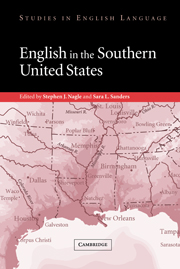Book contents
- Frontmatter
- Contents
- Notes on the contributors
- Acknowledgments
- Introduction
- 1 The origins of Southern American English
- 2 Shakespeare in the coves and hollows? Toward a history of Southern English
- 3 Eight grammatical features of southern United States speech present in early modern London prison narratives
- 4 The shared ancestry of African-American and American-White Southern Englishes: some speculations dictated by history
- 5 The complex grammatical history of African-American and white vernaculars in the South
- 6 Grammatical features of southern speech: yall, might could, and fixin to
- 7 Sounding southern: a look at the phonology of English in the South
- 8 Vowel shifting in the southern states
- 9 Enclave dialect communities in the South
- 10 Urbanization and the evolution of Southern American English
- 11 The Englishes of southern Louisiana
- 12 Features and uses of southern style
- References
- Index
11 - The Englishes of southern Louisiana
Published online by Cambridge University Press: 22 September 2009
- Frontmatter
- Contents
- Notes on the contributors
- Acknowledgments
- Introduction
- 1 The origins of Southern American English
- 2 Shakespeare in the coves and hollows? Toward a history of Southern English
- 3 Eight grammatical features of southern United States speech present in early modern London prison narratives
- 4 The shared ancestry of African-American and American-White Southern Englishes: some speculations dictated by history
- 5 The complex grammatical history of African-American and white vernaculars in the South
- 6 Grammatical features of southern speech: yall, might could, and fixin to
- 7 Sounding southern: a look at the phonology of English in the South
- 8 Vowel shifting in the southern states
- 9 Enclave dialect communities in the South
- 10 Urbanization and the evolution of Southern American English
- 11 The Englishes of southern Louisiana
- 12 Features and uses of southern style
- References
- Index
Summary
Introduction
Sometime in the mid 1980s at a meeting of the Southeastern Conference on Linguistics, a presentation by Michael Montgomery led me to think about how the perceptions, feelings, and opinions of users contribute to the workings of language. Montgomery on that occasion analyzed a number of popular works on southern speech, mostly humorous illustrated booklets of the sort available at convenience stores and restaurant chains along the nation'shighways. His point was not to list the errors and scholarly shortcomings of these works but to demonstrate that such linguistic descriptions by amateurs constitute important ancillary evidence to the understanding of regional variation by professionals.
Since that time, and largely because of the research of Dennis Preston (e.g. 1989, 1993, 1999), sociolinguists have come to understand better the importance of the shared beliefs of members to the language life of communities. According to Preston (1997: 312), “What linguists believe about standards matters very little; what nonlinguists believe constitutes precisely that cognitive reality which needs to be described – one which takes speech community attitudes and perception (as well as performance) into account.” In her contribution to the seventy-fifth anniversary issue of American Speech, Barbara Johnstone uses a popular booklet on Pittsburghese to develop the thesis that popular representations of local dialects will become even more significant in the expanding global economy and culture:
To a certain extent, the leveling forces of increased dialect contact, which encourage people to sound more like people elsewhere, may be counteracted by attempts to cling to local identity by preserving at least one or two features that sound local. Representations of local speech are a key part of this process, because parodies, performances, and other representations are the mechanisms by which people tell each other what sounds local.
(2000: 392)- Type
- Chapter
- Information
- English in the Southern United States , pp. 173 - 188Publisher: Cambridge University PressPrint publication year: 2003
- 5
- Cited by



